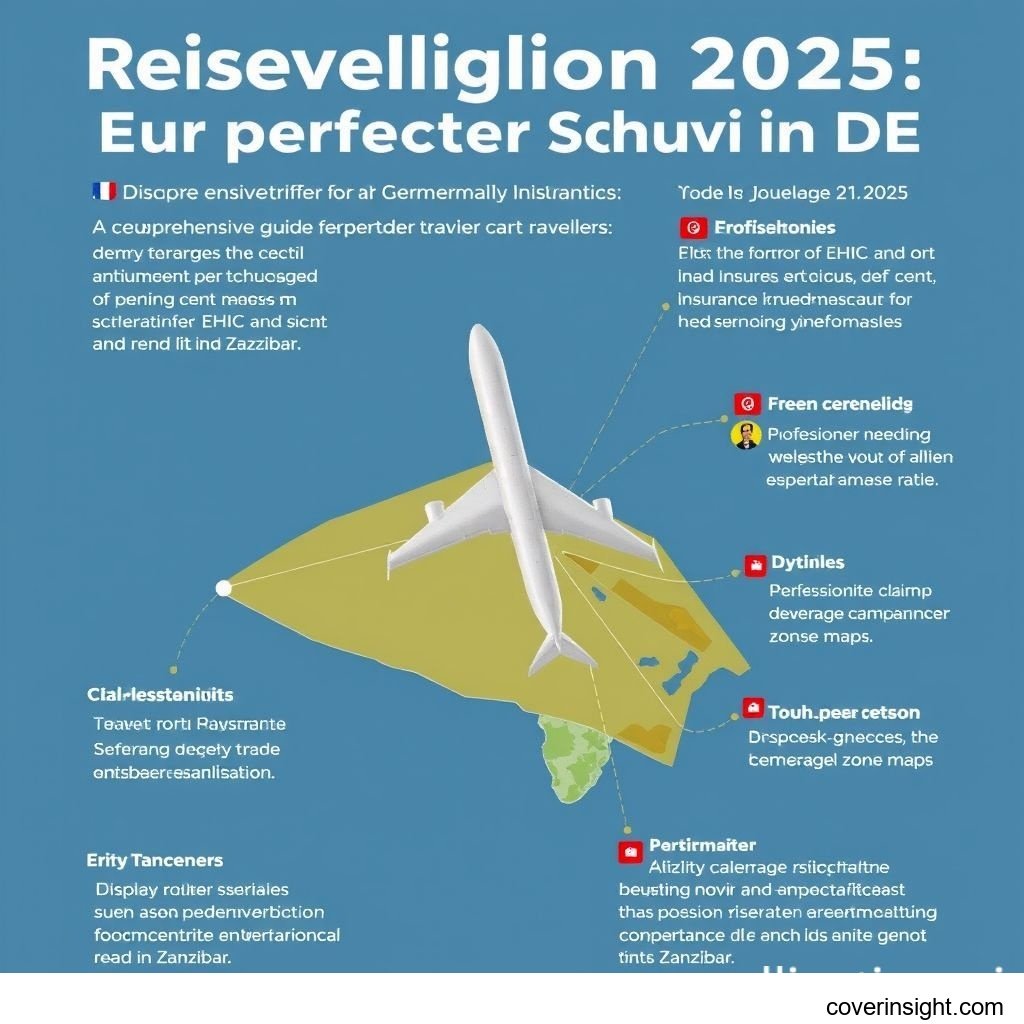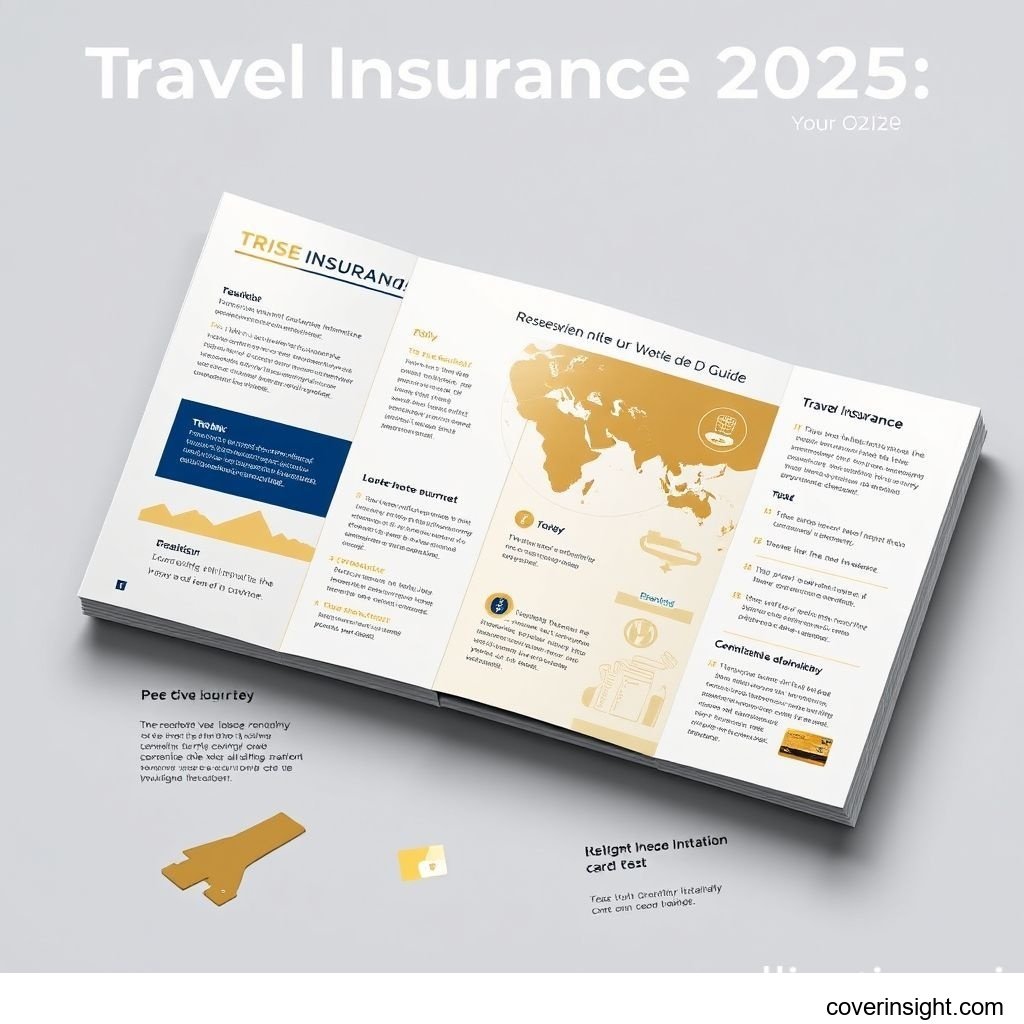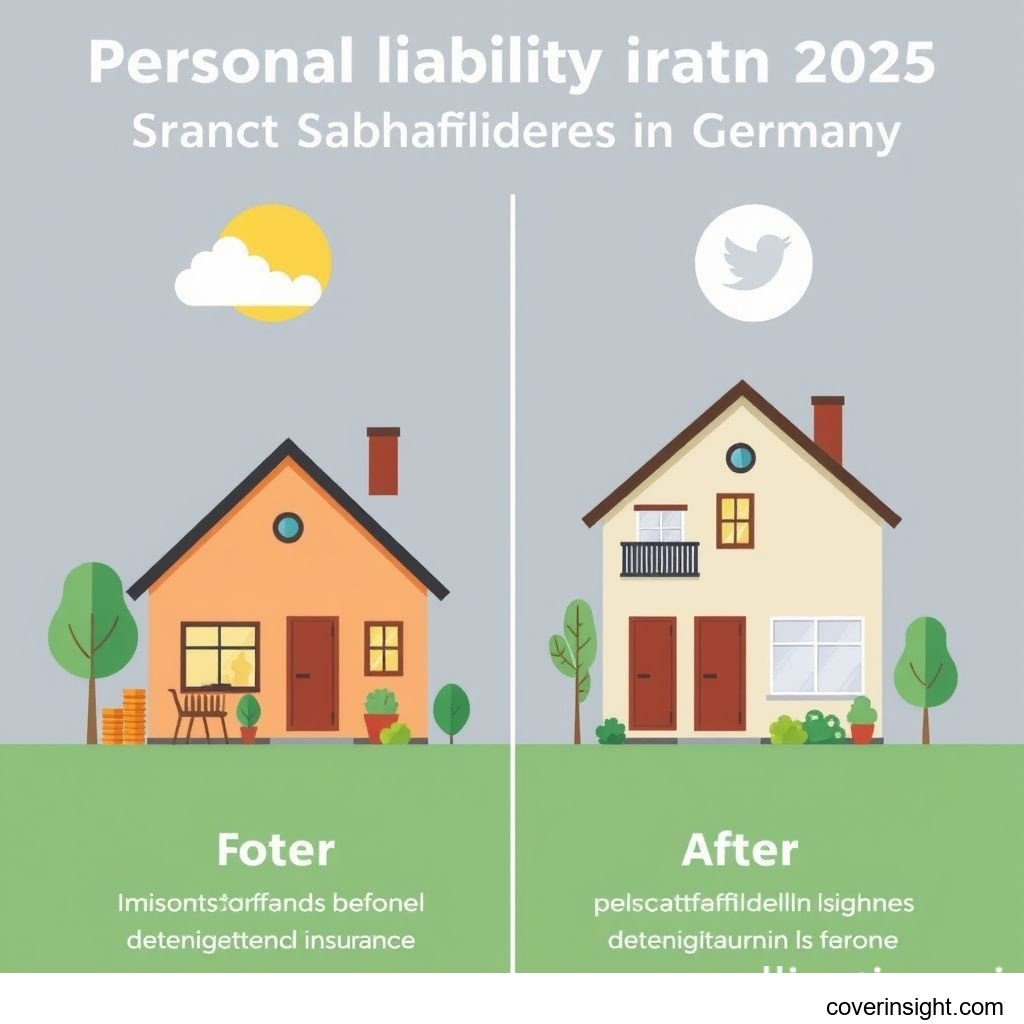Introduction: Understanding What Is Travel Insurance in DE 2025
In an increasingly interconnected world, planning a trip, whether for business or leisure, requires careful consideration of potential risks. For travelers in Germany, understanding what is travel insurance for 2025 is paramount. This essential financial product acts as a safety net, safeguarding you against unforeseen events that could disrupt your journey or incur significant costs. As we look towards 2025, the landscape of travel continues to evolve, making comprehensive protection more important than ever. From minor inconveniences like delayed luggage to major emergencies such as medical crises abroad, what is travel insurance provides peace of mind, allowing you to focus on the experience itself rather than the worries. It's not merely an option but a prudent investment for anyone embarking on a trip, ensuring that you're well-prepared for any eventualities that may arise.
What Is Travel Insurance Coverage Details
Understanding the scope of your coverage is crucial when selecting what is travel insurance. Policies can vary significantly, offering a range of protections tailored to different travel needs and potential risks. It's not just about covering cancelled flights; comprehensive plans delve much deeper into the complexities of modern travel.
What’s Included
Most robust what is travel insurance policies include a combination of key benefits designed to protect you from various eventualities. Here's a breakdown of common inclusions:
-
Trip Cancellation and Interruption: Reimburses non-refundable costs if your trip is cancelled or cut short due to covered reasons (e.g., illness, family emergency, natural disaster).
-
Medical Emergencies Abroad: Covers emergency medical treatments, hospital stays, and doctor visits outside Germany. This is a critical component, as healthcare costs in foreign countries can be exorbitant.
-
Emergency Evacuation & Repatriation: Funds your transportation to the nearest adequate medical facility or back to your home country if medically necessary. A key aspect often included here is medizinischer Rücktransport, ensuring you get home safely for continued care.
-
Baggage Loss, Delay, or Damage: Provides compensation for lost, stolen, or damaged luggage, and sometimes for essential items purchased due to delayed baggage.
-
Travel Delay: Offers reimbursement for accommodations, meals, and other expenses incurred due to significant travel delays.
-
Personal Liability: Covers legal expenses if you accidentally injure someone or damage their property during your trip.
-
24/7 Emergency Assistance: Access to a helpline for immediate support, ranging from medical referrals to lost passport assistance.
Common Exclusions
While what is travel insurance offers extensive protection, it's equally important to be aware of what is typically not covered. Common exclusions include:
-
Pre-existing Medical Conditions: Unless explicitly covered by an add-on, illnesses or conditions you had before purchasing the policy might be excluded.
-
Acts of War or Terrorism: Travel to regions with active conflict zones is generally not covered.
-
Pandemics and Epidemics: Following recent global events, many standard policies now explicitly exclude events related to pandemics, unless specific "epidemic rider" coverage is purchased.
-
Risky Activities: Extreme sports (e.g., skydiving, mountaineering, heliskiing) often require specialized insurance.
-
Negligence or Reckless Behavior: Damages or injuries sustained due to illegal activities or intentional self-harm.
-
Change of Mind: Deciding not to travel without a covered reason will not trigger a claim for cancellation.
-
Alcohol or Drug-related Incidents: Claims arising from intoxication or drug use are typically excluded.
Always read the policy's fine print ("Versicherungsbedingungen") to understand precisely what is travel insurance providing, and what it is not.
Cost Analysis: Investing in What Is Travel Insurance
The cost of what is travel insurance can vary widely, reflecting the breadth of coverage, the destination, and the traveler's specific circumstances. Understanding these factors will help you make an informed decision and manage your budget effectively.
Price Factors
Several elements influence the premium you'll pay for what is travel insurance:
-
Duration of Trip: Longer trips inherently carry more risk and thus command higher premiums. A two-week vacation will be significantly cheaper to insure than a six-month backpacking adventure.
-
Destination: Travel to countries with higher healthcare costs (e.g., USA, Canada) or higher perceived risks will result in higher premiums. Regions prone to natural disasters or political instability may also cost more.
-
Age of Traveler: Older travelers generally face higher premiums due to increased health risks. This is a standard practice across the insurance industry.
-
Type of Coverage: Comprehensive policies, offering extensive medical, cancellation, and baggage benefits, will be more expensive than basic plans that might only cover medical emergencies.
-
Number of Travelers: Family or group policies can sometimes offer a slight discount per person compared to individual policies, but the total cost will naturally be higher.
-
Add-ons: Opting for additional coverage for adventure sports, high-value electronics, or specific pre-existing conditions will increase the overall price of what is travel insurance.
-
Deductibles (Selbstbehalt): Policies with higher deductibles will have lower premiums, but you'll pay more out-of-pocket if you make a claim. Conversely, lower deductibles mean higher premiums but less personal expense during a claim.
Saving Tips
While what is travel insurance is a vital investment, there are ways to optimize its cost without compromising essential protection:
-
Compare Quotes: Never settle for the first offer. Use online comparison portals to evaluate different providers and policies.
-
Annual Policies: If you travel frequently throughout the year, an annual multi-trip policy often proves more cost-effective than purchasing individual policies for each trip.
-
Bundle Policies: Some insurers offer discounts if you bundle your travel insurance with other policies, such as home or car insurance.
-
Check Existing Coverage: Before buying a new policy, review your existing health insurance, credit card benefits, or even homeowner's insurance. Some might offer limited travel protection. For instance, your German health insurance provides basic coverage within the EU, potentially reducing the need for extensive additional medical cover for short EU trips.
-
Adjust Coverage Levels: Opt for a policy that aligns with your specific needs. If you're not carrying expensive electronics, you might not need high-value baggage cover.
-
Consider a Higher Deductible: If you're comfortable with taking on a bit more risk, choosing a higher deductible can significantly lower your premium.
-
Book Early: While not always a guarantee of lower prices, booking your insurance well in advance can sometimes offer better rates and ensures you're covered for cancellation reasons from the moment of purchase.
Essential Health Provisions and the EHIC Nachfolge Karte
When considering what is travel insurance, especially for destinations within Europe, understanding the interaction with national health provisions is crucial. Germany's robust healthcare system provides a baseline, but specific travel insurance elements, such as medizinischer Rücktransport and the future of cross-border health documents, demand attention.
Medical Emergencies and Medizinischer Rücktransport
One of the most critical aspects of any comprehensive what is travel insurance policy is its medical coverage. While your German statutory health insurance (GKV) or private health insurance may cover emergency treatment within the EU (via the EHIC) or through bilateral agreements elsewhere, these often don't include all necessary services. Crucially, they typically do not cover medizinischer Rücktransport back to Germany. This can be an incredibly expensive undertaking, potentially costing tens of thousands of euros, and is almost always excluded from standard health insurance. Therefore, ensuring your what is travel insurance policy explicitly includes comprehensive medical emergency coverage and, most importantly, medizinischer Rücktransport, is vital for peace of mind and financial security. This ensures that if you suffer a severe illness or injury abroad, you can be transported back home for ongoing care, closer to family and your trusted medical professionals.
Understanding the EHIC Nachfolge Karte and Its Implications
The European Health Insurance Card (EHIC) currently allows EU citizens access to medically necessary state-provided healthcare during a temporary stay in any of the 27 EU countries, Iceland, Liechtenstein, Norway, and Switzerland. However, discussions and potential future developments could lead to an "EHIC Nachfolge Karte" or a similar successor system. While the specifics of an EHIC Nachfolge Karte for 2025 are subject to ongoing political and technical developments, its purpose would remain similar: to facilitate access to healthcare.
However, even with an EHIC Nachfolge Karte, there are significant limitations:
-
No Private Healthcare: It only covers state-provided healthcare, not private clinics or doctors, which might be the only option in some areas.
-
No Repatriation: As mentioned, it does not cover medizinischer Rücktransport.
-
Co-payments (Zuzahlungen): You are subject to the same rules and charges as a resident of that country, which may include co-payments not covered by your German health insurance.
-
Non-EU Countries: The EHIC (or an EHIC Nachfolge Karte) is not valid outside the specified European countries.
Therefore, regardless of the status of the EHIC Nachfolge Karte, dedicated what is travel insurance remains indispensable. It fills the gaps, provides coverage for non-EU destinations, and offers crucial benefits like trip cancellation, baggage cover, and that vital medizinischer Rücktransport that no national health card can provide. For more detailed information on German financial regulations and insurance, you can consult BaFin - Federal Financial Supervisory Authority.
Choosing the Right What Is Travel Insurance Policy
Selecting the best what is travel insurance policy can seem daunting given the array of options. However, by focusing on your specific travel habits and needs, you can narrow down the choices and find ideal coverage.
Individual vs. Annual Policies
The first major decision when purchasing what is travel insurance is whether to opt for a single-trip policy or an annual multi-trip policy:
-
Single-Trip Policy: Ideal for individuals or families who travel infrequently (e.g., once or twice a year). It covers a specific trip from its departure date to its return date. This type of policy is tailored to the exact duration and destination of your planned journey.
-
Annual Multi-Trip Policy: More cost-effective for frequent travelers who embark on multiple journeys within a 12-month period. It covers all trips taken within the policy year, usually up to a maximum duration per trip (e.g., 30, 45, or 60 days per trip). This option simplifies the process, as you don't need to purchase what is travel insurance repeatedly.
Consider your travel frequency for 2025. If you anticipate more than two or three trips, an annual policy for what is travel insurance is likely the smarter economic choice.
Tailoring Coverage to Your Needs
Once you decide on the policy type, the next step in choosing what is travel insurance is to tailor the coverage to your specific travel plans:
-
Destination-Specific Risks: Traveling to a region known for extreme weather? Ensure your policy covers natural disaster-related disruptions. Heading for adventure sports? Look for specific endorsements for activities like skiing, diving, or hiking.
-
Health Considerations: If you have pre-existing medical conditions, ensure the policy covers them, often for an additional premium. Also, consider the local healthcare system at your destination – do you need coverage for private hospitals?
-
Valuable Items: If you're traveling with expensive electronics, jewelry, or sporting equipment, check the limits for baggage and personal belongings coverage. You might need an add-on for high-value items.
-
Cancellation Reasons: Review the list of covered reasons for trip cancellation. Does it include common scenarios like job loss or visa denial?
-
Policy Limits and Deductibles: Compare the maximum payout limits for different categories (e.g., medical, cancellation) and decide on a deductible (Selbstbehalt) you are comfortable with. A higher deductible means a lower premium, but more out-of-pocket expense if you claim.
-
Family Plans: If traveling with children, ensure the policy covers all family members comprehensively. Some plans offer free coverage for children under a certain age.
For comprehensive resources on insurance in Germany, you can visit GDV - German Insurance Association.
The Application Process for What Is Travel Insurance
Applying for what is travel insurance is typically a straightforward process, largely thanks to online platforms. However, understanding each step ensures you secure the right coverage efficiently.
Online Application Steps
Most insurers offer a seamless online application for what is travel insurance:
-
Gather Information: Have your travel dates, destination(s), and personal details (names, dates of birth of all travelers) ready.
-
Compare Providers: Utilize online comparison websites or visit individual insurer websites. These platforms allow you to input your travel specifics and compare different policies side-by-side.
-
Select Policy Type: Choose between single-trip or annual multi-trip what is travel insurance based on your travel frequency.
-
Customize Coverage: Add any necessary extensions (e.g., adventure sports, pre-existing conditions, higher limits for valuables) or adjust deductibles.
-
Review Policy Details: Before payment, carefully read the summary of coverage, exclusions, and terms and conditions. Pay close attention to the fine print.
-
Provide Payment Information: Enter your payment details securely. Most providers accept credit cards, direct debit, or popular online payment methods.
-
Receive Confirmation: Upon successful payment, you'll receive a policy document and confirmation via email. Keep this accessible, preferably digitally and in print.
Important Considerations Before Finalizing
Before clicking "purchase" on your what is travel insurance policy, keep these points in mind:
-
Purchase Timing: It’s advisable to purchase what is travel insurance as soon as you make your first non-refundable travel booking (e.g., flight, accommodation). This ensures that cancellation benefits are active from that moment, covering you if you need to cancel before your trip even begins.
-
Read the Fine Print: We cannot stress this enough. The "Allgemeine Versicherungsbedingungen" (General Insurance Conditions) outlines exactly what is travel insurance covering, its limits, and, crucially, its exclusions.
-
Declaration of Health: Be truthful about your medical history, especially regarding pre-existing conditions. Failure to declare accurately could invalidate your policy later.
-
Emergency Contact Information: Ensure you have the insurer's 24/7 emergency contact number readily available when you travel.
-
Documentation: Keep copies of your policy, passport, tickets, and any relevant medical information in a secure, easily accessible place, both physically and digitally.
For more detailed information on general insurance resources, you may find helpful insights on Insurance Resources Global. Our DE Insurance Home page also offers specific guidance for the German market.
FAQs: Everything About What Is Travel Insurance
Navigating the world of what is travel insurance can lead to many questions. Here are answers to some of the most frequently asked queries, providing clarity and helping you make informed decisions for your 2025 travels.
-
How much does what is travel insurance cost?
The cost varies significantly. It depends on factors like the duration of your trip, your destination, your age, the type of coverage selected, and any additional add-ons. A basic policy for a short trip within Europe might cost as little as €20-€50, while a comprehensive annual policy for a family traveling globally could be several hundred euros. The average cost for a single-trip policy is often between 4-10% of your total trip cost, but this is a rough estimate.
-
What affects premiums for what is travel insurance?
Premiums for what is travel insurance are influenced by:
-
Trip Length: Longer trips mean higher premiums.
-
Destination: High-cost countries (e.g., USA) or high-risk regions increase prices.
-
Age: Older travelers typically pay more due to higher health risks.
-
Coverage Level: More comprehensive plans with higher limits cost more.
-
Deductibles: Lower deductibles (Selbstbehalt) result in higher premiums.
-
Activities: Coverage for adventure sports or dangerous activities increases costs.
-
-
Is what is travel insurance mandatory in Germany?
No, purchasing what is travel insurance is not legally mandatory for German citizens traveling abroad. However, it is highly recommended. For some specific destinations, especially those requiring a Schengen visa, proof of travel medical insurance with a minimum coverage amount (e.g., €30,000) is a prerequisite for visa approval. Even when not mandatory, the financial risks of traveling without it can be substantial.
-
How to choose the best what is travel insurance?
To choose the best what is travel insurance for your needs:
-
Assess Your Trip: Consider your destination, activities, and trip duration.
-
Evaluate Your Health: Disclose pre-existing conditions and ensure they are covered.
-
Determine Coverage Needs: What risks are you most concerned about (medical, cancellation, baggage)?
-
Compare Providers: Use online tools to compare policies, prices, and customer reviews.
-
Read the Policy Wording: Understand what's included and excluded before purchasing.
-
Consider Your Budget: Balance comprehensive coverage with affordability.
-
-
What are the consequences of no coverage for what is travel insurance?
Traveling without what is travel insurance can lead to severe financial consequences:
-
Hefty Medical Bills: You'll be personally responsible for all overseas medical costs, which can quickly amount to tens of thousands of euros.
-
No Emergency Repatriation: Without medizinischer Rücktransport coverage, you would have to bear the immense cost of being transported home if you fall seriously ill or are injured.
-
Lost Trip Costs: If your trip is cancelled or interrupted, you'll lose all non-refundable expenses (flights, accommodation, tours).
-
Baggage Loss: You won't be compensated for lost, stolen, or damaged luggage.
-
Legal Fees: You could face significant legal expenses if you cause an accident or damage property abroad.
-
In summary, while what is travel insurance isn't always a legal requirement in Germany, it's an indispensable safeguard that offers crucial protection against a multitude of unforeseen events, making it a wise investment for any journey.







Comments